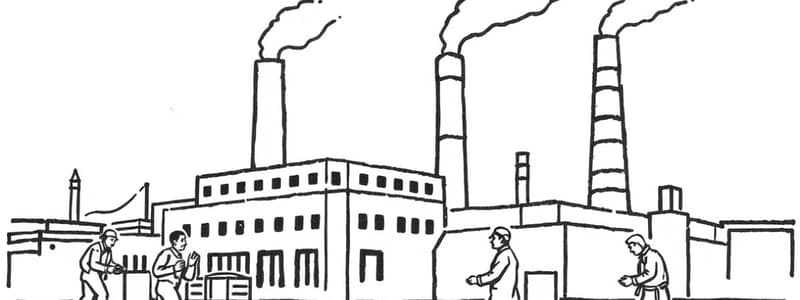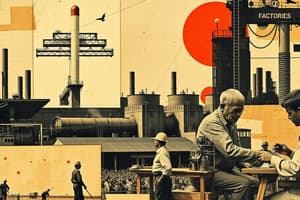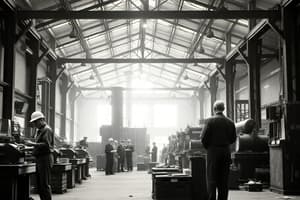Podcast
Questions and Answers
What facilities must be provided for washing in every factory?
What facilities must be provided for washing in every factory?
- Shared facilities for male and female workers
- Facilities that are difficult to access
- Facilities that are not maintained
- Adequate and suitable washing facilities (correct)
Separate facilities for washing must be provided for male and female workers.
Separate facilities for washing must be provided for male and female workers.
True (A)
What should be provided for the storing and drying of wet clothing in factories?
What should be provided for the storing and drying of wet clothing in factories?
Suitable places for keeping clothing not worn during working hours and for the drying of wet clothing.
The Chief Inspector can require seating arrangements for workers who should stand while working.
The Chief Inspector can require seating arrangements for workers who should stand while working.
Which statement is NOT true regarding first aid facilities in factories?
Which statement is NOT true regarding first aid facilities in factories?
What is required in factories where more than five hundred workers are ordinarily employed?
What is required in factories where more than five hundred workers are ordinarily employed?
Under what condition should a canteen be provided in factories?
Under what condition should a canteen be provided in factories?
Match the following requirements with their descriptions:
Match the following requirements with their descriptions:
What is required for shelters, rest rooms, and lunch rooms in factories with more than 150 workers?
What is required for shelters, rest rooms, and lunch rooms in factories with more than 150 workers?
What is the short title of the Act discussed?
What is the short title of the Act discussed?
When did the Factories Act, 1948 come into force?
When did the Factories Act, 1948 come into force?
What does 'Adult' mean in the context of the Factories Act?
What does 'Adult' mean in the context of the Factories Act?
Define 'Adolescent' as per the Factories Act.
Define 'Adolescent' as per the Factories Act.
What is the definition of a 'Child' in this Act?
What is the definition of a 'Child' in this Act?
What does 'Young person' mean according to the Act?
What does 'Young person' mean according to the Act?
What is implied by 'hazardous process'?
What is implied by 'hazardous process'?
What does the term 'machinery' include as per the Act?
What does the term 'machinery' include as per the Act?
Flashcards are hidden until you start studying
Study Notes
Chapter V: Welfare Provisions under The Factories Act, 1948
-
Washing Facilities: Factories must provide washing facilities that are adequate, suitable, separated for genders, conveniently accessible, and kept clean. Standards may be set by the State Government for specific factories or processes.
-
Clothing Storage: The State Government can mandate suitable places for storing clothing not worn during working hours and for drying wet clothing in any factory or class of factories.
-
Seating Arrangements: Factories must provide seating for workers required to stand, allowing for rest opportunities. The Chief Inspector can require seating arrangements if sitting work is deemed efficient for specific tasks.
-
First Aid Provisions: Factories must have first-aid boxes or cupboards, with at least one for every 150 workers. A responsible certified individual should manage these. Factories with over 500 workers need an ambulance room with medical staff and equipment readily available.
-
Canteen Requirements: Factories employing over 250 workers must operate a canteen. Rules can dictate the provision timeframe, construction standards, food served, charges, and management representation to ensure worker involvement.
-
Shelters and Rest Areas: Factories with over 150 workers must provide adequate shelters, rest rooms, and lunch rooms, including drinking water facilities. A canteen fulfills part of this requirement, and no food consumption in work areas is allowed if a lunchroom exists.
-
Maintenance Standards: All welfare facilities like shelters and rooms must be sufficiently lighted, ventilated, and maintained in a hygienic condition, ensuring comfort and health for workers during breaks.
Factories Act, 1948
Chapter I: Preliminary
- The Factories Act, 1948, applies to the entire territory of India and came into effect on April 1, 1949.
- Key definitions include:
- Adult: A person aged eighteen and above.
- Adolescent: A person aged between fifteen and eighteen.
- Child: A person under the age of fifteen.
- Definitions also specify terms such as:
- Competent person: Recognized by the Chief Inspector for conducting tests and inspections.
- Hazardous process: Any industrial activity that poses health risks without special precautions or leads to environmental pollution.
Chapter II: The Inspecting Staff
- Occupiers must comply with general duties related to safety and health standards.
- Manufacturers are responsible for ensuring that articles used in factories meet prescribed safety and health norms.
- Inspectors have the authority to inspect factories and enforce compliance.
- Certifying surgeons are designated to conduct health assessments and ensure worker safety.
Chapter III: Health
- A range of health standards is mandated, including:
- Cleanliness and waste disposal.
- Adequate ventilation and temperature control.
- Control over dust, fumes, and humidity.
- Ensured lighting and provision of safe drinking water.
- Accessibility and maintenance of sanitation facilities such as latrines and urinals.
Chapter IV: Safety
- Strict safety measures are outlined for various factory operations:
- Machinery must be fenced and operate without exposing workers to danger.
- Regulations exist for the employment of adolescents and young persons near hazardous machinery.
- Provisions for safe lifting equipment and protection against hazards such as excessive weights, fumes, and fires.
- Maintenance of buildings and machinery is enforced to prevent accidents.
- Safety officers are mandated to oversee compliance with safety regulations.
Studying That Suits You
Use AI to generate personalized quizzes and flashcards to suit your learning preferences.




